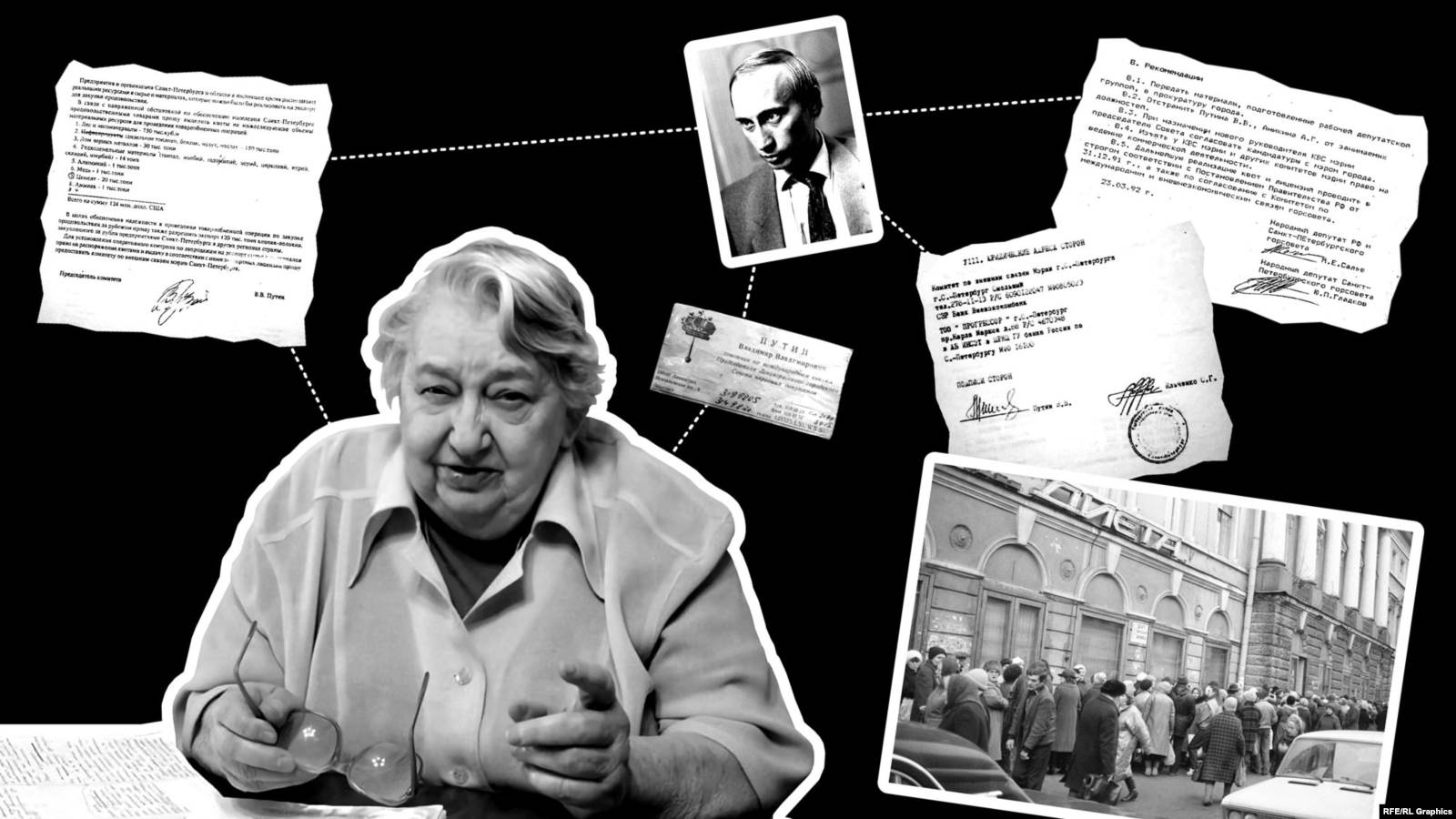The first serious malfeasance allegations against Vladimir Putin came from a liberal member of St. Petersburg’s city council in the early 1990s named Marina Salye.
A geologist by training and a political acolyte of Soviet-era dissident Andrei Sakharov, Salye led a special legislative commission to examine the city’s External Relations Committee (KVS), which was headed by the 40-year-old former KGB operative. Although Putin had only led the KVS for a few months when Salye’s commission began its investigation in 1992, the whiff of corruption was already in the air.
The Salye commission determined that the committee had signed agreements to export some $100 million in commodities, including rare-earth metals and oil products, in exchange for much-needed foodstuffs for the city of some 5 million. The food never arrived, and the obscure companies that had been granted the export licenses disappeared.
"Agreements were concluded with God knows what kind of companies," Salye told RFE/RL’s Russian Service in 2010. "These companies were clearly set up for temporary, one-off purposes.”
Many of the documents related to the Salye commission’s work have been archived online by the Havighurst Center for Russian and Post-Soviet Studies of Miami University, in Ohio, “to prevent them from disappearing from the Internet.”
Salye’s final report did not accuse Putin or his deputy, Aleksandr Anikin, of personal corruption, but rather of failures of oversight. It called for Mayor Anatoly Sobchak to dismiss them both. The city council forwarded the commission’s findings to prosecutors for further investigation.

However, neither city prosecutors nor federal agents took up the case, which was quietly swept under the rug with no consequences for Putin. In the 2000 campaign biography First Person, Putin denied wrongdoing and blamed the companies involved.
Salye continued her political activism in St. Petersburg after Putin moved on to Moscow in 1996. She spoke out publicly against Putin’s candidacy for the presidency in 2000, endorsing Konstantin Titov, then the governor of the Samara region.
After Putin became president, Salye largely retired from public life, moving to a remote village in the Pskov region and rarely visiting St. Petersburg.
In 2010, she spoke to RFE/RL’s Russian Service in what would turn out to be her final major interview. Salye discussed her decision to withdraw from public life.
“I had a meeting with [liberal Russian lawmaker Sergei] Yushenkov in early 2000,” she recalled. “My Free Democrats party wanted to join forces with him. I had very close relations with Sergei. But I saw in his office a person that I never, ever wanted to see under any circumstances. I can’t say his name. But I understood at that moment that I should leave.”

“Since 2000, I have either not agreed to be interviewed or have warned journalists that I would not say anything about Putin,” Salye added.
Yushenkov himself was shot dead in Moscow in April 2003, just hours after registering his liberal political party for the elections in December of that year that landed the Putin-backed United Russia party a parliamentary majority it has held ever since.
In 2010, Salye signed an online petition calling for Putin, who was serving as prime minister, to resign.
In February 2012, Salye addressed a St. Petersburg rally calling for free elections. She also announced plans to join the Civic Platform party of Russian billionaire Mikhail Prokhorov, who ran against Putin in the 2012 presidential election.
On March 21, 2012, Salye died of a massive heart attack at her home in the Pskov region. She was 77.
In Salye’s obituary in The New York Times, her longtime friend Tatyana Dorutina said Putin’s rise to the presidency disheartened Salye.
“When Putin came to power she said: ‘This is for a long time. This won’t end,’” Dorutina recalled. “And I said, ‘It’s only for four years,’ and she said: ‘No, this will last a long time. There’s no point in being a politician anymore. The Putin regime is here to stay.’”

